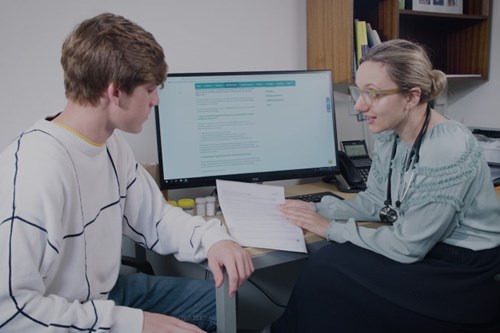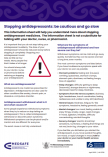If you're a frequent visitor to Healthify, why not share our site with a friend? Don't forget you can also browse Healthify without using your phone data.
Antidepressants
Key points about antidepressants
- Antidepressants are a group of medicines used to treat moderate to severe depression.
- Antidepressants work best when they are used together with psychological therapies, like CBT (cognitive behavioural therapy) and lifestyle changes.
- Read about how to take antidepressants safely and possible side effects.

Antidepressants are medicines that are mainly used to treat moderate to severe depression. They can help improve mood and increase motivation for people who may have lost interest in activities they once enjoyed. They can also help with sleep, thinking and concentration. Antidepressants work best when they are used together with psychological therapies, like CBT (cognitive behavioural therapy) and lifestyle changes. Read more about treating depression.
Antidepressants are not usually needed, and are often not very effective for mild depression. CBT, talking therapy and regular exercise work better for mild depression.
Antidepressants are also used to treat other conditions such as generalised anxiety disorder (GAD), eating disorders, obsessive-compulsive disorder and post-traumatic stress disorder. They are also sometimes used to treat people with long-term (chronic) pain.

Image credit: 123RF
If you need help or want to talk to somebody about your mental health, you can get support from any of the following:
- Free call or text 1737 any time for support from a trained counsellor
- Lifeline 0800 543 354 (0800 LIFELINE) or free text 4357 (HELP)
- Suicide Crisis Helpline 0508 828 865 (0508 TAUTOKO)
- Healthline 0800 611 116
- Samaritans 0800 726 666.
There are many types of antidepressants. Different medicines suit different people. The choice of antidepressant medicine will depend on:
- the severity and type of your illness
- whether you have other medical conditions
- other medicines you might be taking
- your response to antidepressant medicines in the past
- possible side effects.
|
Antidepressants available in Aotearoa New Zealand |
|
|---|---|
|
Selective serotonin reuptake inhibitors (SSRIs)
|
|
|
Serotonin and noradrenaline reuptake inhibitors (SNRIs)
|
|
|
Tricyclic antidepressants (TCAs)
|
|
|
Monoamine-oxidase inhibitors
|
|
|
Other antidepressants |
Some people find that herbal products like St John's Wort can be useful for depression but it can interact with antidepressant medicines and other medicines. Before taking herbal supplements, ask your doctor or pharmacist if they interact with the medicine you are taking.
We don't know for certain, but researchers think that antidepressants work by increasing the activity of certain chemicals working in our brains called neurotransmitters. Certain neurotransmitters, such as serotonin and noradrenaline, are linked to mood and emotion.
While depression is not simply a deficiency of these chemicals, we do know that antidepressant medications help to relieve symptoms of depression and anxiety in about 50–70% of people who try them. Some people will respond to one antidepressant better than another so changes may be needed to find the best type and dose of medicine for you.
Neurotransmitters may also affect pain signals sent by nerves, which would explain why some antidepressants can help relieve long-term pain.
Antidepressant medicines work best if you take them every day. When you first start taking an antidepressant medicine, you won’t feel better straight away. Most people start to feel better after taking them for 2 to 4 weeks. However, it can take up to 6 to 8 weeks for them to really work.
How long you need to take antidepressants for will depend on a number of factors and is best discussed with your doctor. Most people will need to take these medicines for at least 6 to 12 months. If you stop taking it too early, your signs of depression or anxiety may come back. During the first few months of treatment, you'll usually see your doctor or a specialist nurse at least once every few weeks to see how well the medicine is working.
If you're ready to come off your antidepressant medicine, or think it isn't working for you, don't stop taking it suddenly. The dose of these medicines should be slowly reduced over 4 weeks or more.
- Some people get withdrawal symptoms when they try to reduce or stop taking an antidepressant.
- Withdrawal symptoms can be different for everyone. They usually come on within 5 days of stopping the medicine and generally last 1 to 2 weeks. Some people have severe withdrawal symptoms that last for several months or more.
- If you have taken a high dose of antidepressants for a long time you are more likely to have withdrawal symptoms. Some antidepressants are more likely to cause withdrawal symptoms, eg, amitriptyline, clomipramine, paroxetine and venlafaxine.
Talk to your doctor about how to stop taking your medicine slowly. They will work out a plan with you. They will slowly lower the amount you take over several weeks until you’re not taking it at all. This lowers the chance of getting withdrawal symptoms as you stop taking it. Withdrawal may include feeling dizzy, tired or worried, or having trouble sleeping. Read more about stopping antidepressants.(external link)
Talk to your doctor or your healthcare team if you are stopping your medicine and feel like you might harm yourself or others, or if your low mood or anxiety returns.
Like all medicines antidepressants can cause side effects but not everyone gets them. Different antidepressants have different side effects. Most side effects are mild and go away after a few weeks as your body gets used to the medicine. Examples include having trouble sleeping (insomnia), feeling like you might throw up (nausea) and feeling dizzy.
At the start of treatment some people can experience side effects such as agitation and anxiety, especially in the first few weeks. Keep in mind that things will get better and these side effects are likely to pass as your body gets used to the new medicine. Talk to your healthcare provider about what you can do if side effects are a problem or if you think you might harm yourself or others. They may suggest taking a smaller dose (amount) or trying a different medicine.
Read more about medicines and side effects and reporting a reaction you think might be a side effect.
If you suspect you, or someone you know, might be suffering from depression, read more from our depression section or visit thelowdown.co.nz(external link) or depression.org.nz(external link) for helpful information, including a self-test.
The following links provide further information on antidepressants. Be aware websites from other countries may contain information that differs from Aotearoa New Zealand recommendations.
Treatments(external link) Depression.org.nz
Antidepressants(external link) Royal College of Psychiatrists, UK
Antidepressants(external link) Patient Info, UK
Antidepressants – selecting one that's right for you(external link) Mayo Clinic, US
Depression – treatment options(external link) Option Grid
Resources
Stopping antidepressants: be cautious and go slow(external link) Medsafe and Ministry of Health, NZ, 2023
5 questions to ask about your medications(external link) Health Quality and Safety Commission, NZ, 2019 English(external link), te reo Māori(external link)
References
Brochures
 Stopping antidepressants: be cautious and go slow Medsafe NZ and Ministry of Health, NZ, 2023
Stopping antidepressants: be cautious and go slow Medsafe NZ and Ministry of Health, NZ, 2023

Medicines and side effects
Healthify He Puna Waiora, NZ, 2024

5 questions to ask about your medications
Health Quality and Safety Commission, NZ, 2019
Credits: Sandra Ponen, Pharmacist, Healthify He Puna Waiora. Healthify is brought to you by Health Navigator Charitable Trust.
Reviewed by: Angela Lambie, Pharmacist, Auckland
Last reviewed:
Page last updated:





